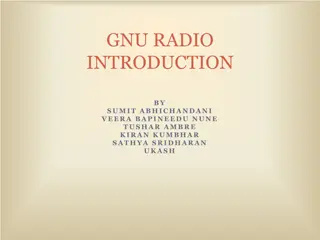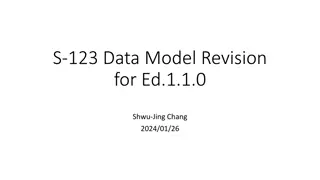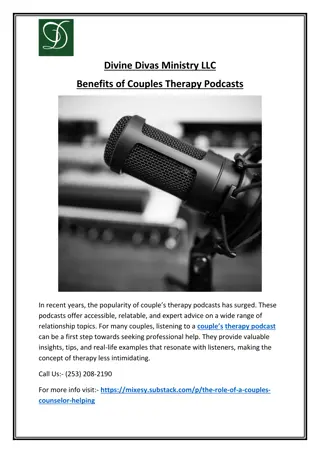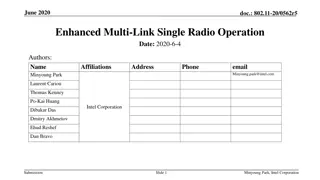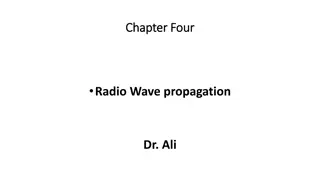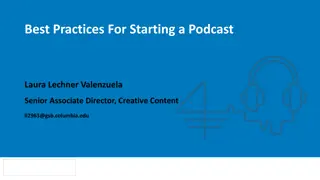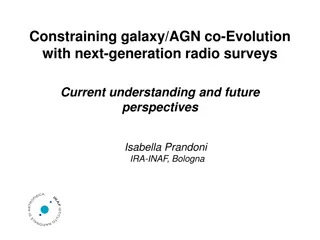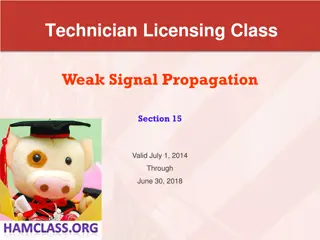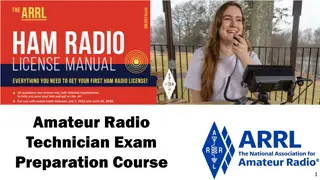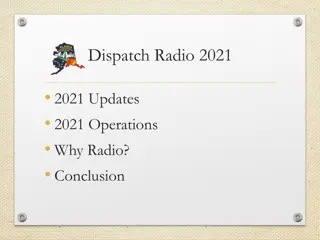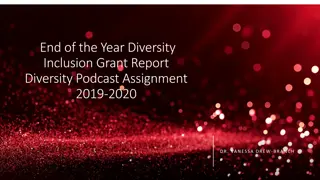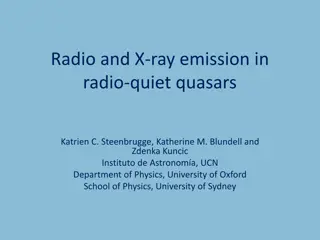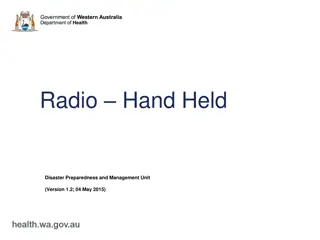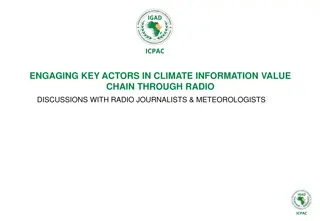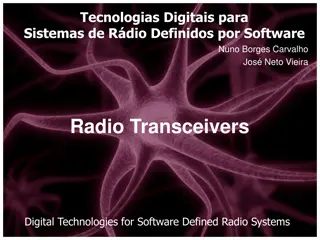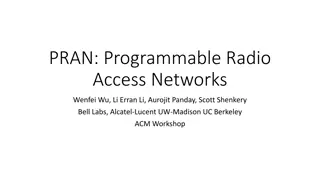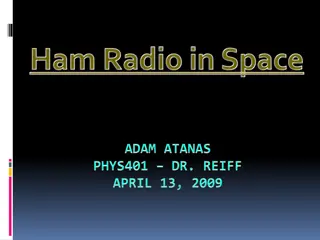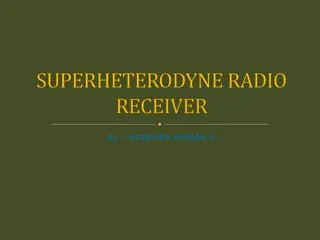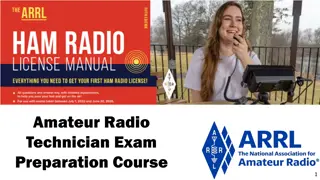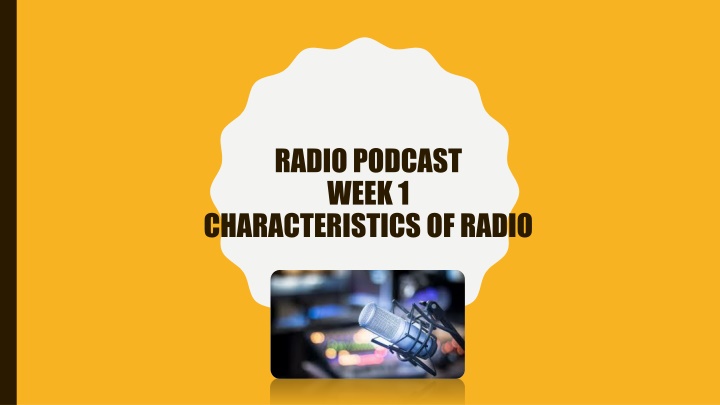
Key Characteristics and Elements of Radio Broadcasting
Explore the unique features of radio, including its ability to create mental images, instantaneous messaging, simplicity, and cost-effectiveness. Discover the advantages of radio's independence from electric power and its accessibility to illiterate populations. Uncover the essential elements of radio like human voice, music, sound effects, and silence, and learn how they contribute to the radio listening experience.
Download Presentation

Please find below an Image/Link to download the presentation.
The content on the website is provided AS IS for your information and personal use only. It may not be sold, licensed, or shared on other websites without obtaining consent from the author. If you encounter any issues during the download, it is possible that the publisher has removed the file from their server.
You are allowed to download the files provided on this website for personal or commercial use, subject to the condition that they are used lawfully. All files are the property of their respective owners.
The content on the website is provided AS IS for your information and personal use only. It may not be sold, licensed, or shared on other websites without obtaining consent from the author.
E N D
Presentation Transcript
RADIO PODCAST WEEK 1 CHARACTERISTICS OF RADIO
CHARACTERISTICS OF RADIO Radio makes pictures: Radio is an audio medium, but the radio helps listener to visualise its content. The speed of radio: Radio is fast medium, as its messages are broadcasted and received instantly ( live broadcasting). You can also participate ( call in) during the live radio program. Simplicity of radio: It is very simple and cost effective medium. Nowadays you have people running their own internet radio stations from their own homes. Inexpensive: The production of radio program can be done for free and you need very little equipment to record radio program.
Radio does not need electric power: You can listen to a radio using dry battery cells even if you do not have electric power or a generator. For many poor courtiers and remote places without internet and electricity radio is the only form of media available. We usually listen to the radio while we are driving, traveling, having radio in the background while we are doing various tasks. You don not have to be literate to listen to the radio: There are still parts of the world ( especially in rural area) where people are illiterate and would not be able to read newspaper and would not have television. Listening to the radio is a way of getting news etc.
SOME DISADVANTAGES OF RADIO No visual reference: As said earlier Radio is an audio medium,. Sometimes we need visual reference to understand when is something happening. For example the major disaster like Australian bushfires. It is said Seeing is believing , so having no visual references is a major limitation of the radio
ELEMENTS OF THE RADIO Human voice Music Sound effects Silence
VOICE Voice is the most important element on the radio. It can provoke different reactions on the listener depending of its intention.
MUSIC The purpose of music on the radio is to set the mood, give pace, set the location, contribute to character s feelings (in case of radio drama) etc.
SOUND EFFECTS The purpose of sound effects is to add sense of reality and help listeners imagine the scene, recording they are listening to.
SILENCE Silence is a very important element on the radio. It is used to emphasise tension, importance of the situation, to give interviewee time to answer questions etc. However, you have to be very careful as there is no much space for silence on the radio. You have to think how to engage and keep your listener interested in your program.
LIVE RADIO SHOW VERSES PODCAST Schedule vs On-Demand The first major differences between live radio and podcasting is that the scheduling and listening habits will be very different. With live radio, you have a set schedule and you have to stick to that. Essentially, you have to work around a clock-based schedule like this:
If your audience tunes in halfway through a show, there is an entire other half of the show that they have missed. This is why, as a live radio presenter, you will often have to re-introduce yourself, the show, the station and the topic of conversation. PODCAST With a podcast, your listeners can download or stream the episodes whenever they like so they can fit in their listening around their own schedule. This means there is no need to repeat yourself after the initial introductions as the audience can easily skim back to the beginning if they have forgotten what or who they were listening to.
2. MASS APPEAL VS NICHE Another key difference between live radio and podcasting is the audiences they are appealing to. Radio stations aim to appeal to a mass audience with a broad range of programmes. Podcasts try to appeal to a more niche audience, due to their focus on individual topics. Your target audience for a podcast is more likely to stumble across your content as they will be actively searching online for the information that your podcast is covering.
3. LIVE VS PRE-RECORDED A large difference between podcasting and live radio is the fact that live radio cannot be edited after it has been broadcast, whereas podcasts are pre-recorded so they can easily be adjusted after recording. In a podcast format, you can record and re-record sections as many times as you need to. You can also edit sections of content out if, after listening back to them, you decide they don t quite fit in. Through doing this, you can get rid of any mistakes made and make everything sound very clean and polished.
NOW AND AFTER Radio is an instant medium. The minute a radio show goes live, it is broadcast and then after a while, it s over. If you record your shows then you will, of course, have that as a copy of it, but a listener is unlikely to go back and listen to an entire recording of a 5-hour long show, including advertisements and interviews that may be outdated by the time they start listening. However, what a lot of radio stations are starting to do is condensing radio shows into their best bits. For example, https://www.bbc.co.uk/programmes/p02nrvj8/episodes/downloads Your podcast will be online forever, your target audience will always be able to find your content as long as they are searching for it.
Your turn now In pairs you will discuss what type of radio show would appeal to young people ( one that you would like to listen to) and than use the basic radio show clock to create your own radio show on the next slide. Come up with the title of the show What type of program is it? Who would be the presenter and why Interview: who would you interview and what would be the topic Come up with playlist ( songs to be played in music section of the program) Live callers ( what is the topic / or competition about) Live session ( what would be about) Why do you think your program would be successful
TASK In your own words explain the main differences between radio and podcast. Look at the BBC radio schedule for a day (any day) and note down type of programs played on different stations (BBC Radio1, Radio 2 and Radio 4). What does that tell us about the target audience of each station. What kind of listeners they are trying to target and attract. Identify a few programmes that are live shows and few that are pre-recorded. How do we know? What are the indicators of a live show and the pre recorded program. Search for some radio podcasts. Who do you think is their target audience.
Unit 3 Radio Industry Why get into radio? It is the best time to get into the radio With digital radio becoming so prominent these days, there are more genres and more areas of radio than ever before. These include both commercial and independent radio stations that broadcast all kinds of different shows, with content ranging from sport and music to debate and news. And many of them have plenty of graduate jobs on offer!
What will I need to get into radio? Most careers in radio will require some sort of training or qualification. Audio engineers, for example, will need to have specialist sound engineering training to break into the industry, either through a degree or relevant vocational qualification. A lot of people in the radio industry work their way up before taking on more responsibility. If you re planning to become a radio presenter or DJ, it might be a good idea to undertake a specialist radio presenter course. The training will allow you to refine your speaking skills and give you a voice for radio.
What roles can I pursue in a radio career? The main job roles in creative industry are split between: Creative Technical Management positions As station manager, for example, you ll be the head of the station. Your role will be all about taking charge and managing the DJs, producers and technical team. If the technical side of radio is more your thing, and you ve got a vested interest in sound engineering, then you could be more suited to the world of audio engineering. You ll assist the presenters, producers and DJ in actively broadcasting the radio show. You ll ensure that all technical hiccups are dealt with and that everything runs as smoothly as possible.
Creative Producer They decide what features and interviews each show should include. They are in charge of all the content. They tell the DJ what needs to be mentioned and may even have the final say in what music is going to be played. Radio producers are also the people that liaise with sponsors, advertisers and media buying agencies.
Creatives Finally, we have the showmen, the voices we hear from day to day. The presenters and DJs. There is a difference between the two. Presenters usually present individual sections of the radio show. For example, they might be the person that reads the news. A DJ is responsible for keeping the show moving and interesting. They re the people that we get to know pretty well, e.g. Zane Lowe, Terry Wogan or Chris Moyles. They keep people entertained between songs with banter, debate and jokes. They interview guests, talk to listeners and control phone-ins. To become a successful radio DJ, you re going to have to be confident, enthusiastic, interesting and witty and have the ability to develop your own individual style. You ll also be in charge of mixing music and dropping in the occasional cheeky sound bite or sound effect.
Words from radio industry professionals 7 TIPS ON GETTING INTO RADIO/TV | MEDIA INDUSTRY, CAREER ADVICE | AFIA KUFUOR https://www.youtube.com/watch?v=1NL46c-0g5c 20 Ways to Become a Great Radio Presenter https://www.youtube.com/watch?v=qG-78lqWx48 How I got my first job in radio https://www.youtube.com/watch?v=bzy6ALm-5ko Job profile: Production Coordinator at BBC Radio Ulster https://www.youtube.com/watch?v=Dr8dEqNMucs Job profile: Assistant Content Producer in BBC Radio Ulster https://www.youtube.com/watch?v=dRAdqJJtyvI Radio assistant producer https://www.youtube.com/watch?v=perTSNPOwCU Job profile: Junior Researcher in BBC Learning https://www.youtube.com/watch?v=y3C3_a1aFhE
RADIO INDUSTRY JOB ROLES In pairs research and discuss the type of jobs in radio industry (create a mind map of your findings) Take a picture of the mind map and copy it in your work. Comment on what you have found out and what three type of jobs you would be interested in. Research: What does the job entail Job requirements and the level of education and training you would need to have to get into the job. Who would you work with (which department creative, technical, management) Usual type of contract (permanent, freelance etc.) Salary Progression opportunities
Setting up radio station / show Where do I start ? Research what equipment and resources would you need to set up an independent radio station and make your own radio shows (Get some ideas and guides from experts) What software would you need to record, edit and broadcast your shows, programs How much would it cost to set up and run your own radio station / show. What experience would you need? How would you broadcast your show and reach your target audience? Remember to provide links and evidence of your research.
The power of radio One Halloween morning, 1938, Orson Welles awoke to find himself the most talked about man in America. The night before, Welles and his Mercury Theatre on the Air had performed a radio adaptation of H.G. Wells s The War of the Worlds, converting the 40- year-old novel into fake news bulletins describing a Martian invasion of New Jersey. Some listeners mistook those bulletins for the real thing, and their anxious phone calls to police, newspaper offices, and radio stations convinced many journalists that the show had caused nationwide hysteria. By the next morning, the 23-year-old Welles s face and name were on the front pages of newspapers coast-to-coast, along with headlines about the mass panic his CBS broadcast had allegedly inspired. Orson Wells The War of the Worlds (1938 radio drama) Documentary Orson Welles - The Untold Story Behind The War Of The Worlds https://www.youtube.com/watch?v=ptfsRfiOiWo
Fake news and power of media Research about Orson Welles and a radio adaptation of H.G. Wells s The War of the Worlds. Place the play in a historic context / time and historic circumstances when it was broadcasted and explain why did it create mass hysteria when it was broadcasted. Explain why broadcast of The War of Words is important in history of broadcasting. What was ground breaking about it. Give some specific examples in your answer.

